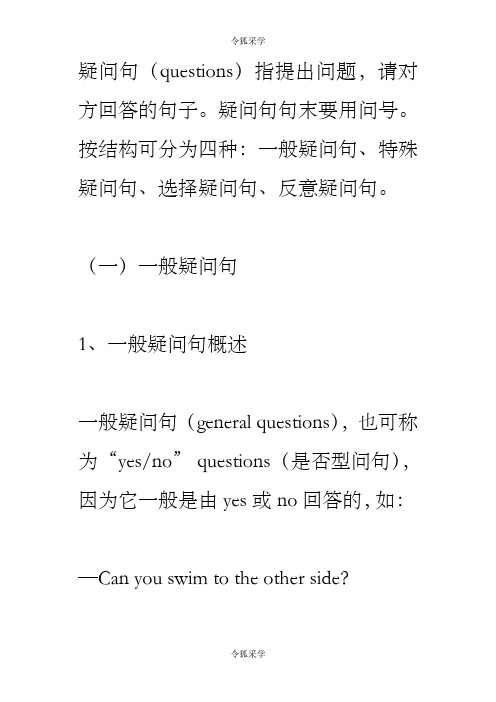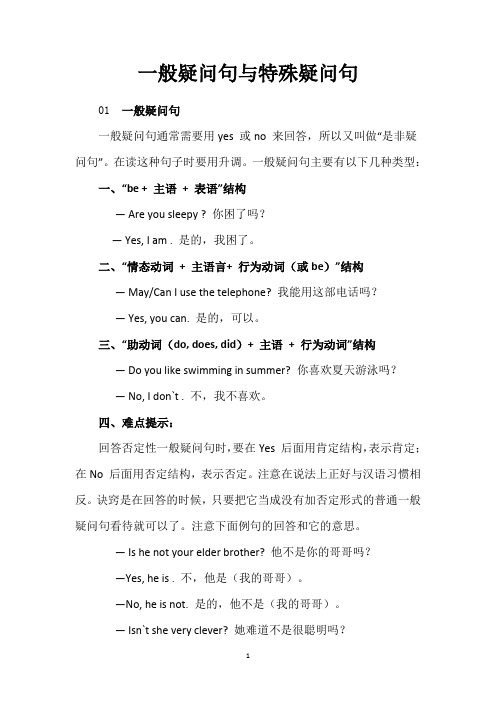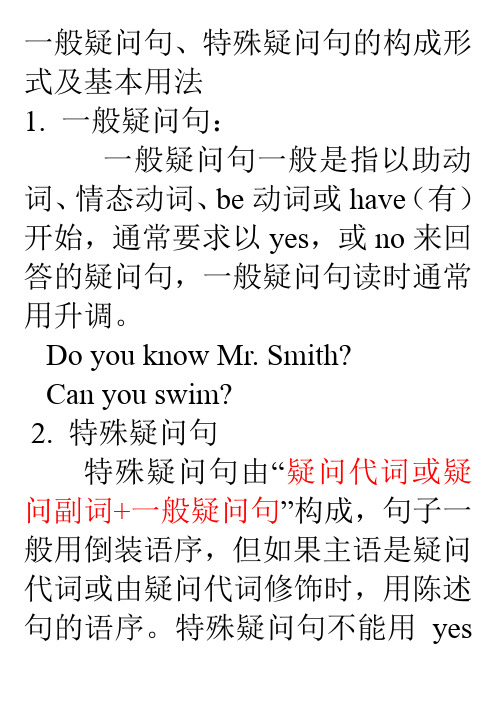一般疑问句-特殊疑问句
一般疑问句和特殊疑问句知识点总结

疑问句最常见的疑问句有两类:1.一般疑问句:可以用Yes和No回答的问句2.特殊疑问句:以特殊疑问词7w1h(比如what/how等等)开头的疑问句一般疑问句(句型结构会根据时态发生相应的细微变化,但总体框架不变)①be动词+主语+其他?(注意be动词和主语的匹配)例句:Are you a policeman? 你是个警察吗?-Yes, I am. 是的,我是。
-No, I am not. 不,我不是。
②情态动词+主语+动词原形+其他?(注意情态动词后面跟动词原形)例句:Can you swim? 你会游泳吗?-Yes, I can. 是的,我会。
-No, I can’t. 不,我不会。
③助动词+主语+动词原形+其他?(注意助动词和主语的匹配)例句:Do you like dancing? 你喜欢跳舞吗?-Yes, I do. 是的,我喜欢。
-No, I don’t. 不,我不喜欢。
Do you go to school every day? 你每天去学校吗?做句型转换的方法(如何将陈述句变成一般疑问句):先看句子中是否有be动词或者情态动词A.如果有be动词或者情态动词,对照一般疑问句句型①/②将be动词或者情态动词提到句首,其他部分依次照抄B.如果没有be动词或者情态动词,对照一般疑问句句型③句首+助动词(注意是否要和主语匹配变化),其他部分依次照抄,注意原来的动词要变为原形#无论是哪一种情况,都要注意第一人称要变成第二人称,第二人称要变成第一人称(you和I的切换)特殊疑问句(句型结构会根据时态发生相应的细微变化,但总体框架不变)①特殊疑问词(作主语)+谓语+其他?(陈述句语序)例句:Who is reading a book? 谁正在读书?Which is the biggest? 哪个是最大的?Who likes dancing? 谁喜欢跳舞?②特殊疑问词(作主语修饰语)+主语+谓语+其他?(陈述句语序)例句:Whose bag is red? 谁的包是红色的?How many people work in the school?有多少人在学校工作?③特殊疑问词+一般疑问句(详见上面的一般疑问句结构)?(此情况为当特殊疑问词代替的部分不是主语或者主语修饰语时)例句:What are you doing? 你在做什么?What colour do you like? 你喜欢什么颜色?做句型转换的方法(如何将句子转变成特殊疑问句):先看划线部分是否为句子中的主语或者主语修饰语A.如果是主语,对照特殊疑问句句型①划线部分用特殊疑问词代替,其他部分照抄(该疑问句为陈述句语序)B.如果是主语修饰语,对照特殊疑问句句型②划线部分用特殊疑问词代替,其他部分照抄(该疑问句为陈述句语序)C.如果不是主语或者主语修饰语,对照特殊疑问句句型③先将原来的陈述句变成一般疑问句(如果本来就是一般疑问句就不需要再做修改)划线部分用特殊疑问词代替再将特殊疑问词提前到句首#如果划线部分是动词或者动词短语,表示做什么事,那变为特殊疑问词的时候要用do what 代替特殊疑问词主要分为两类:wh- (wh开头的疑问词)和how - (how开头的疑问词)How often:多长时间一次,问频率。
疑问句大全——一般疑问句、特殊疑问句、选择疑问句、反意疑问句

疑问句(questions)指提出问题,请对方回答的句子。
疑问句句末要用问号。
按结构可分为四种:一般疑问句、特殊疑问句、选择疑问句、反意疑问句。
(一)一般疑问句1、一般疑问句概述一般疑问句(general questions),也可称为“yes/no” questions(是否型问句),因为它一般是由yes或no回答的,如:—Can you swim to the other side?你能游到对岸吗?—Yes, I can.是的,我能。
—No,I can’t.不,我不能。
—Have you locked the door?你锁门了吗?—Yes,I have.是的,锁了。
—No,I haven’t. 不,没有锁。
2一般疑问句的结构(1)基本的结构为:be/助动词/情态动词+主语+谓语/表语+(其他),句子要读升调,如:Are they your friends?他们是你的朋友吗?Does he go to school on foot?他是步行去上学吗?Will you be free tonight?你今晚有空吗?Can you play basketball?你会打篮球吗?(2)陈述句亦可用作一般疑问句,多用在非正式文体中,句末有问号,用升调,如:Somebody is with you?有人和你一起吗?He didn’t finish the work?他没有做完活吗?You are fresh from America,I suppose?我猜,你刚从美国回来吧?3、一般疑问句的答语(1)一般疑问句一般由yes或no来回答,如:—Are you tired?你累了吗?—Yes,I am.是的,累了。
—No, I’m not.不,不累。
—Does she do the cleaning?她扫除了吗?—Yes ,she does.是的,她打扫了。
—No,she doesn’t.不,她没打扫。
一般疑问句与特殊疑问句

一般疑问句与特殊疑问句01一般疑问句一般疑问句通常需要用yes 或no 来回答,所以又叫做“是非疑问句”。
在读这种句子时要用升调。
一般疑问句主要有以下几种类型:一、“be + 主语+ 表语”结构— Are you sleepy ? 你困了吗?— Yes, I am . 是的,我困了。
二、“情态动词+ 主语言+ 行为动词(或be)”结构— May/Can I use the telephone? 我能用这部电话吗?— Yes, you can. 是的,可以。
三、“助动词(do, does, did)+ 主语+ 行为动词”结构— Do you like swimming in summer? 你喜欢夏天游泳吗?— No, I don`t . 不,我不喜欢。
四、难点提示:回答否定性一般疑问句时,要在Yes 后面用肯定结构,表示肯定;在No 后面用否定结构,表示否定。
注意在说法上正好与汉语习惯相反。
诀窍是在回答的时候,只要把它当成没有加否定形式的普通一般疑问句看待就可以了。
注意下面例句的回答和它的意思。
— Is he not your elder brother? 他不是你的哥哥吗?—Yes, he is . 不,他是(我的哥哥)。
—No, he is not. 是的,他不是(我的哥哥)。
— Isn`t she very clever? 她难道不是很聪明吗?— Yes, she is. 不,她很聪明。
— No, she is not . 是,她不聪明。
02特殊疑问句一、特殊疑问句是用来提出来特定问题的疑问句,要求听到问题的人针对特定情况来做具体的回答,不能像一般疑问句一样简单地用Yes 或No 来回答,特殊疑问句要用降调来读。
二、特殊疑问句的结构:特殊疑问词+ 一般疑问句Who do English homework in the evening?谁晚上做英语家庭作业?What do you do in the evening?你晚上做什么?What homework do you do in the evening?你晚上做什么家庭作业?When do you do English homework?你什么时候做英语家庭作业?三、注意:对人提问时wh o“谁”对所属(谁的)提问用whose“谁的”对哪一个提问用which“哪一个”对时间提问用when“什么时候”或what time“几点”对物体提问用what“什么”对地点提问用where“哪里”对原因提问用why“为什么”对方式提问用how“怎么样”对数量提问用how many“多少”(用于可数名词复数)或how much“多少”(用于不可数名词)四、难点提示1、以why开头的特殊疑问句否定形式常用于表示建议、请求等。
一般疑问句、特殊疑问句的构成形式及基本用法

一般疑问句、特殊疑问句的构成形式及基本用法1. 一般疑问句:一般疑问句一般是指以助动词、情态动词、be动词或have(有)开始,通常要求以yes,或no来回答的疑问句,一般疑问句读时通常用升调。
Do you know Mr. Smith?Can you swim?2. 特殊疑问句特殊疑问句由“疑问代词或疑问副词+一般疑问句”构成,句子一般用倒装语序,但如果主语是疑问代词或由疑问代词修饰时,用陈述句的语序。
特殊疑问句不能用yes或no回答,读时用降调。
例如:Who is on duty today?How long have you been in Beijing? What time do you get up every morning?What must I do now?3. 注意疑问词的选择1. 问“谁”用who或whom。
如:Who is a doctor?Li Lei is a doctor.(对主语提问用who,对宾语提问用who,whom均可)2. 问“谁的”用whose。
如:Whose book is this?This is his book.3. 问“地点”用where。
如:Where is the ball?The ball is under the bed.4. 问“原因”用why。
如:Why didn't he come?He didn't come because he was ill.5. 问“身体状况”用how。
如:How are you?I'm fine.6. 问“方式”用how。
如:How did he do it?He did it in that way.7. 问“程度”用“how +被修饰语”。
如:How wide is the river?The river is five metres wide.8. 问“多少”用how much或how many。
一般疑问句和特殊疑问句知识点总结

一般疑问句和特殊疑问句知识点总结疑问句最常见的疑问句有两类:1.一般疑问句:可以用Yes和No回答的问句2.特殊疑问句:以特殊疑问词7w1h(比如what/how等等)开头的疑问句一般疑问句(句型结构会根据时态发生相应的细微变化,但总体框架不变)①be动词+主语+其他?(注意be动词和主语的匹配)例句:Areyoua policeman?你是个警察吗?-Yes, I am.是的,我是。
-No, I am not.不,我不是。
②情态动词+主语+动词原形+其他?(注意情态动词后面跟动词原形)例句:Canyouswim?你会游泳吗?-Yes, I can.是的,我会。
-No, I can’t.不,我不会。
③助动词+主语+动词原形+其他?(注意助动词和主语的匹配)例句:Doyoulikedancing?你喜欢跳舞吗?-Yes, I do.是的,我喜爱。
-No, I don’t.不,我不喜欢。
Doyougoto school every day?你每天去学校吗?做句型转换的方法(如何将陈述句变成一般疑问句):先看句子中是否有be动词或者情态动词A.如果有be动词或者情态动词,对照一般疑问句句型①/②将be动词或者情态动词提到句首,其他局部依次照抄B.如果没有be动词或者情态动词,对照一般疑问句句型③句首+助动词(注意是不是要和主语婚配变化),其他局部依次照抄,注意原来的动词要变为真相#无论是哪种情况,都要注意第一人称要酿成第二人称,第二人称要酿成第一人称(you和I的切换)非凡疑问句(句型结构会根据时态发生相应的细微变化,但总体框架不变)①特殊疑问词(作主语)+谓语+其他?(陈述句语序)例句:Whois reading a book?谁正在读书?Whichis the biggest?哪个是最大的?Wholikes dancing?谁喜爱跳舞?②非凡疑问词(作主语修饰语)+主语+谓语+其他?(陈说句语序)例句:Whosebagis red?谁的包是红色的?How manypeoplework in the school?有多少人在学校工作?③特殊疑问词+一般疑问句(详见上面的一般疑问句结构)?(此情况为当特殊疑问词代替的部分不是主语或者主语修饰语时)例句:What areyoudoing?你在做什么?What colour doyoulike?你喜欢什么颜色?做句型转换的方法(如何将句子转变成特殊疑问句):先看划线局部是不是为句子中的主语或者主语修饰语A.如果是主语,对照非凡疑问句句型①划线部分用特殊疑问词代替,其他部分照抄(该疑问句为陈述句语序)B.如果是主语修饰语,对照特殊疑问句句型②划线部分用特殊疑问词代替,其他部分照抄(该疑问句为陈述句语序)C.如果不是主语或者主语修饰语,对照特殊疑问句句型③先将原来的陈述句变成一般疑问句(如果本来就是一般疑问句就不需要再做修改)划线局部用非凡疑问词替代再将特殊疑问词提前到句首#如果划线局部是动词或者动词短语,表示做什么事,那变为非凡疑问词的时候要用do what替代非凡疑问词主要分为两类:wh-(wh开头的疑问词)和how - (how开头的疑问词)疑问词whatwhowhosewhichwherewhenwhywhat for what colour what day what date what time 含义什么谁谁的哪一个在哪里什么时候为什么为什么什么颜色星期几什么日期几点钟用法问东西问人问归属问挑选问地址问时间问原因。
一般疑问句与特殊疑问句

一般疑问句与特殊疑问句一.肯定句、否定句、一般疑问句和特殊疑问句定义1.肯定句:表示肯定的意思, 即不含有否定词“不”。
比如:我是一个学生。
I am a student.他去上学。
He goes to school.2.否定句:表示否定的意思。
比如:我不是一个男孩。
I am not a boy。
他不去上学 He does not go to school.3. 一般疑问句:回答为“是yes”或者“否no”的问句。
比如:你是一个学生吗? Are you a student? 你喜欢英语吗? Do you like English?4. 特殊疑问句:回答不是“是yes”或者“否no”的问句,根据提问内容具体回答。
比如:现在几点了?What’s the time? 哪一支笔是你的? Which is your pen?二、肯定句、否定句、一般疑问句和特殊疑问句的相互转换有am, is, are的句子肯定句变否定句:在am, is, are后面加上not,其余按顺序照抄。
肯定句变一般疑问句:把am, is, are提前放到句首并大写Am, Is, Are,其余照抄。
肯定句变特殊疑问句(就划线部分提问):分3步骤第一步:先变一般疑问句第二步:找合适的特殊疑问词代替划线部分第三步:特殊疑问词提前放到句首,并大写,其余按顺序照抄,省略划线部分。
注意:1.一定先变一般疑问句。
但是,如果问的是主语或主语的定语时,语序不变,为"特殊疑问词(+主语)+陈述句"。
如:Li ming 's not here today. Who's not here today? 今天谁没来?2.划线部分不能在特殊疑问句中出现。
例如:1.肯定句、否定句和一般疑问句的互换肯定句:This is a book.否定句:This is not a book.一般疑问句:Is this a book? 肯定回答:Yes, it is. 否定回答:No, it isn’t.2.就划线部分提问(变特殊疑问句) This is a book.第一步:变一般疑问句 Is this a book?第二步:找合适的特殊疑问词 Is this what ?第三步:特殊疑问词提前放到句首,并大写,其余按顺序照抄,省略划线部分。
一般和特殊疑问句
• when
• 为什么
• why
• 如何
• how
特殊疑问词短语
1. what time:
• 问时间点
2. what colour
• 什么颜色)
3. what weather
• 什么天气
4. 什么学科
• what subject
5. 多少
• How many/much
6. 多长
• How long:
0
●动词的及物性
●主谓一致
出现严重中的语法和选词错误, 导致误解或不能理解所表达的信 息,比如: ●疑问词错误 ●结构不完整,而且意义不连贯
不影响理解所表达的信息 导致不能理解所表达的信息
0.5 基本按照要求传递了信息
信0 息
不能按照要求传递信息
1.5 按照要求传递了信息
基本按照要求传递信息(漏
1
了一、两点次要信息、或添
Who should be responsible for this matter?
2.谁想和我一起去购物? Who wants to go shopping with me?
3. 那个女孩是谁?
Who is that girl?
对物主代词和名词所有格提问用whose。“谁的
1.这是谁的英语书? Whose English book is this?
加了无关信息)
0
不能按照要求传递信息
情景介绍
• 角色:你是女士的同事
• 任务:(1)和女士谈论生活和明晚去参加 音乐会的相关事情
•
(2)根据谈话内容回答问题
7:18
明天晚上的音乐会你会想去吗?
Would you want to go to the concert tomorrow? 我们在哪儿见面?
一般疑问句特殊疑问句
• 2.没be就用do/does/did. • 针对一般现在时和一般过去时 • eg:1.They plant many trees on the hill. • Do they plant many trees on the hill? • 注:如果是动词原形,把do放在句首。 • 2.He goes to school early everyday. • Does he goes to school early everyday? • 动词是单三形式的,要把does放于句首,动词单三变原形。
• 3.They arrived here 3 hours ago.
• Did they arrive here 3 hours ago? • 动词是过去式的,要把did提前,同时,句中的过去式还原成原
形。
特殊疑问句
• 1.定义:以特殊疑问词开头,对句中某一成分提 问的句子叫特殊疑问句。
• 2.常用的疑问词有:what 、who 、whose 、which 、 when 、where 、how 、why等。
问句了。 • eg:1.He is a student. • Is he a student? • 2. They are sweeping the floor. • Are they sweeping the floor? • 3.There is a river in the picture. • Is there a river in the picture? • 4.The students were dancing in the park yesterday. • Were the students dancing in the park yesterday?
Who谁——Whose谁的(加se) • Why为什么 • When什么时候 • Where在哪里 • Which哪一个 • What什么 ( What time什么时间 What color什么颜色) • How 怎么样 • How many多少{数量} • How much多少钱{价格},多少(对不可数名词进行提问) • How long多长 • How often多少次 • How big多大 • How heavy多重{重量 • How far多远{路程}
英语学习中一般疑问句与特殊疑问句的区别和问答
英语学习中一般疑问句与特殊疑问句的区别和问答1.一般疑问句:1)问:be动词+主语+…? (与前面讲过的肯定句句式比较一下) 答:Yes, 主语+be动词。
/No, 主语+be动词+not.*Are you a teacher? Yes, I am. No, I am not.Is he a doctor? Yes, he is. No, he is not.Are they students? Yes, they are. No, they are not.2) 问:助动词+主语+do动词的原形+…?答:Yes, 主语+助动词。
/No, 主语+助动词+not.Do you play computer games everyday? Yes, I do. No, I don’t.Does he play computer games everyday? Yes, he does. No, he doesn’t. Did you play computer games yesterday? Yes, we did. No, we didn’t. 2.特殊疑问句:1)疑问词+be动词+主语+….? (与第一个一般疑问句的句式比较一下)(答句的句式同肯定句句式)*What are you? (I am a teacher.)What is he? (He is a doctor.)What are they? (They’re students.)2)疑问词+助动词+主语+do动词的原形或do/be+…?(答句的句式同肯定句句式)*What do you do every day? When do you play computer games?(I play computer games everyday.)What does he do every day? When does he play computer games? (He plays computer games everyday.)What did you do every day? When did you play computer games? (We played computer games yesterday.)。
一般疑问句和特殊疑问句
小学英语语法提高/一般疑问句和特殊疑问句疑问句可再分为一般疑问(General question)和特殊疑问(Special question)两种。
1.一般疑问:用be或助动词或情态动词置于句首,并以“Yes,…”,或“No,…”或相当于ye s / no回答的问句称为一般疑问句.2. 含系动词be的一般疑问句的构成具体地说,am 只能跟在第一人称的单数I 后面,are 搭配you, 不管是单数还是复数,is 跟在第三人称单数he, she 后面,be 动词的基本意思:是如:I'm in Class 2, Grade 1. →Are you in Class 2, Grade 1? 你是在一年级二班吗?(如遇第一人称,最好将其置换成第二人称)It's a map of China. →Is it a map of China? 这是一幅中国地图吗?be 或have(有)置于句首来表达疑问,例:A m I wrong again? (我又错了?)Yes, you are (wrong again). (是的,你又错了。
)No, you aren’t. (不,你没错。
)Is it your bicycle? (这辆自行车是你的吗?)Yes, it is. (是的,是我的。
)No, it isn’t. (不,那不是我的。
)Were there many people at her birthday party?(她的生日宴会来了很多人吗?)Yes, there were. (是的,来了很多人。
)No, there weren’t. (没有,没有很多人。
)Have you money with you? (你身上带钱了吗?)(=Do you have money with you?—美语)Yes, I have.(Yes, I do.—美语)(有,我带钱了。
)No, I have no money with me. (No, I don’t.—美语)(没有,我没带钱。
- 1、下载文档前请自行甄别文档内容的完整性,平台不提供额外的编辑、内容补充、找答案等附加服务。
- 2、"仅部分预览"的文档,不可在线预览部分如存在完整性等问题,可反馈申请退款(可完整预览的文档不适用该条件!)。
- 3、如文档侵犯您的权益,请联系客服反馈,我们会尽快为您处理(人工客服工作时间:9:00-18:30)。
一般疑问句(yes / no questions), 相当于汉语中的“……吗”语序:系动词be /助动词/情态动词+主语+其他成分如:Are you from JapanYes I am./ No I'm not.Is her sister doing her homework nowYes she is./ No she isn't.Does he work in a bankYes he does./ No he doesn't.Do you live near your schoolYes I do./ No I don't.Can you speak FrenchYes I can./ No I can't.May I go home nowYes you may./ No you mustn't.注意:1.将陈述句变为一般疑问句时,如句中有be 动词(am is are …)时,可直接将它们提至主语前。
如主语为第一人应将其改为第二人称。
如:I'm in Class 2 grade 1.→ Are you in Class 2 grade 1We're watching TV.→ Are you watching TV2.陈述句中有情态动词(can may must …)时,也可直接将它们提至主语前,即可成为一般疑问句。
如:He can swim now.→ Can he swim nowThe children may come with us.→ May the children come with us3.陈述句中只有一个实义动词作谓语且其时态为一般现在时,变为一般疑问句时要在句首加do或does 主语后的实义动词用原形。
如:I like these animals.→ Do you like these animalsShe wants to go to the movies.→ Does she want to go to the movies4.一般疑问句一般读升调(↑)5.一般疑问句有时不用yes或 no 回答。
如:Are they in town now I think so.May I sit hereCertainly.Does he like soccerSorry I don't know.二、特殊疑问句以疑问词开头,对句中某一成分提问的句子叫特殊疑问句常用的疑问词有:what who whose which when where how why等。
特殊疑问句有两种语序:1.如疑问词作主语或主语的定语,即对主语或主语的定语提问,其语序是陈述句的语序:疑问词(+主语)+谓语动词+其他成分如:who is singing in the room whose bike is broken2.如疑问词作其他成分,即对其他成分提问,其语序是:疑问词+一般疑问句语序如:What class are you inWhat does she look likeWhere are you fromWhat time does he get up every morningHow do you know注意:1.回答特殊疑问句时,不能用yes / no,即问什么答什么,尤其是简略回答。
如:Who is from Canada Helen (is).Where's the restaurant Near the station.Why do you like koalas Because they are cute.一般疑问句练习题将下列句子改为一般疑问句:1. His teacher is from the .2. These babies are crying.3. Our friends can swim.4. I hate to have onions.5. I take the bus to school.6. He likes to play trumpet.7. His mother take the train to work.8. He whistles under the tree.9. His birthday is in October10. Mrs. Li and Kitty whisper behind the house.11. Kitty is wearing her new dress.12. The boy sitting next to his mother eats ice-cream.13. He plays computer games every day.14. I want to have a model car.15. She wants a cup of tea.16. Mrs. Li and Kitty see a movie at night.17. I do my homework everyday.特殊疑问句练习题一、选择正确的单词填空(who, where, when)1._____ is that pretty girl She is my sister.are Jack and Tom They are behind you.do you go to school I go to school from Monday to Friday.has a beautiful flower John has a beautiful flower.are they They are my parents.is my mother She is in the living room.are you going We are going to the bakery(面包坊).do Jim and Wendy play ball They play ball in the afternoon.does he jog He jogs in the park.are you from I'm from Changchun city.二、就画线部分提问is my father.2.They are under the tree.3.I often watch TV after dinner.(晚饭后) 提示:饭后强调的是时间问题。
4.Lily swims in the swimming pool.(游泳池)5.Superman flies in the sky.often brush my teeth in the evening.likes to play with Bill.'s father plays badminton(羽毛球) every weekend.supermarket is near the school.laptop(笔记本电脑) is on the table.has a pair of earrings(耳环).flowers are in the flower pot(花盆).grandpa took us to the zoo.put the gold fish(金鱼) into the fish tank(鱼缸).monkey sleeps at night.特殊疑问句练习(二)一.用what time, what color, what day, what填空。
1. A: ______ _______ is it B: It is nine o’clock.2. A: ______ _______ does your mother get up B: My mother gets up at 6:30.3. A: ______ _______ do you go to bed B: I go to bed at 10:00.4. A: ______ _______ do Diana and Fiona have supper B: Diana and Fiona have supper at 18:00.5. A: ______ _______is it B: It is purple.6. A: ______ _______ is the sky B: The sky is blue.7. A: ______ _______ is your coat B: My coat is black.8. A: ______ _______ is the dog B: The dog is white.9. A: ______ _______ is today B: Today is Monday.10. A: ______ _______ is tomorrow B: Tomorrow is Tuesday.11. A: ______ _______ was yesterday(昨天) B: Yesterday was Sunday.12. A: ______ _______ do you like B: I like red.13. A: ______ is this This is a computer(电脑).14. A: ______ are you doing B: We are playing basketball.15. A: ______ does your mother do B: My mother is a policewoman.16. A: ______ are those B: Those are peppers(辣椒).17. A: ______ is in the box B: A lovely doll is in the box.18. A: ______ is on the table B: The apple is on the table.19. A: ______ is in the classroom The blackboard is in the classroom.20. A: ______ ______ ______ B: Mary is hungry.二.连线:(Match)1. What’s on the chair A There is a book in the bag.2. How is your father B These are apples.3. What are these C I go to school by bus.4. What is in the bag D The radio is on the chair.5. How do you go to school E My father is fine.6. How much is it F I wash my face in the morning.7. What time is it G I have two hands.8. When do you wash your face H It is four o’clock.9. How many hands do you have I It is 5 RMB(人民币).do you have lunch J I have lunch。
